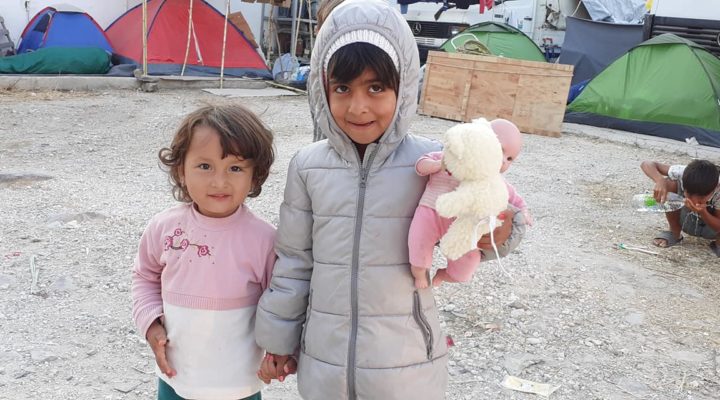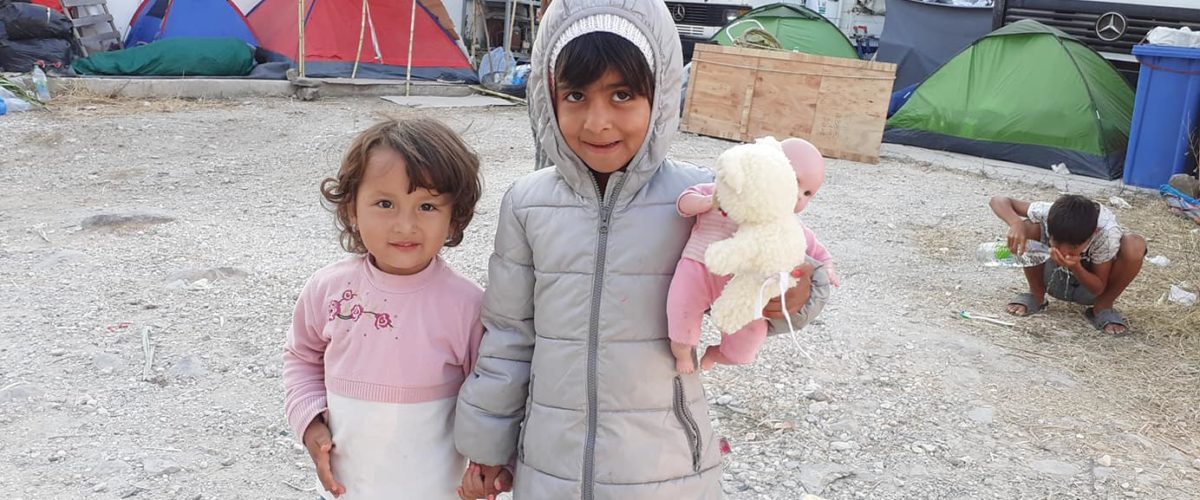You may have read in the news about the terrible fire that destroyed Camp Moria, the extremely overcrowded refugee camp on Lesbos. I was on the island during this fire.
The night of the fire was incredibly windy. I could barely sleep as the tempestuous wind rushed around my house, but I had no idea that anything else was wrong until the next morning, when I heard the news. That crazy wind had sped the fire on until it spread to all of Camp Moria. Almost everything was destroyed.
But on my way to the airport the next morning, I saw something even scarier than a fire.
What hate looks like
I was in the car with Hubert, one of our team leaders from Germany, and Ali, my fiancé, who came to Europe as a refugee from Afghanistan. We had heard that some of the roads were blocked by police and weren’t sure if I would make it to my flight on time. We were driving down a familiar road when we saw a group of men up ahead with black masks, weapons and a truck. I thought these men were police. Thankfully, Hubert knew better and turned the car around immediately.
“Those are the Neo-Nazis,” he said.
I had heard that a Neo-Nazi attack was part of the fire, but I didn’t understand why they were blocking the road now.
“They’re waiting to beat up the refugees leaving Moria,” Hubert explained.
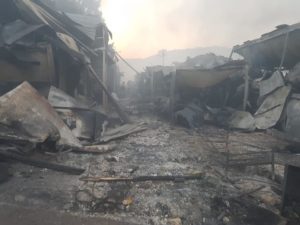
Remnants of the Lesbos refugee camp after the fire.
After everything these refugees had been through — living through war, fleeing their homes, braving the sea to get to Greece, constantly fighting to survive, multiple coronavirus lockdowns, and now, a fire that destroyed everything — these men hated the refugees so much that they wanted to inflict even more pain. They wanted to hurt whomever they could find. They wanted to feel some sense of power and control through the refugees’ suffering.
I couldn’t believe it. But there it was.
I never had been so scared before, but it mostly wasn’t for myself — it was for Ali in the back seat. If a Neo-Nazi group on the road saw him and recognized him as an Afghan, they might try to hurt him. It was the first time I truly felt how the color of my skin might help protect me from evil people like this, but that my fiancé would be a target.
We had to drive the long way around the island to reach the airport. I couldn’t appreciate any of Lesbos’ beautiful scenery that morning. As we drove, Hubert pointed out some individual men on motorcycles wearing camouflage, which he said was the typical Neo-Nazi dress there. Every person we saw felt like a threat.
“What I want you all to remember is, hate doesn’t start out looking like this. It starts out simpler, subtler, more palatable.”
Thank God, we didn’t have any other incidents. We reached the airport safely, I made it to my flight, and Hubert and Ali made it back home.
That morning showed me a lot about what hate looks like. I think it’s something I’ll be processing for a long time.
What I want you all to remember is, hate doesn’t start out looking like this. It starts out simpler, subtler, more palatable. It starts out in everyday racism and discrimination. But this is where it ends up. That’s why we each have to examine our hearts to keep prejudice at bay.
What love looks like
But there also was another, wonderful side to my time in Lesbos.
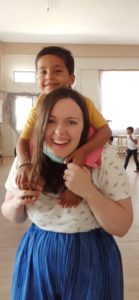
The author with a refugee child.
I was in Lesbos for a total of 10 days. It was a great opportunity to join Ali and his team in the refugee work he’s been doing on the Greek islands for the past two and a half months. His work is done through Refugee Relief Lesbos, a project of Forum Wiedenest.
During my time there, the team’s ministry center, Peace House, was offering food, child care, English classes and Bible classes to refugees. The refugees coming to the center were Christians from Afghanistan and Iran — people who had risked their lives because of their faith. They were mostly still new to Christianity and were hungry to learn more.
My primary role in the team was musician and worship leader. They hadn’t had anyone there to sing worship songs in Farsi or Dari (the main languages these refugees speak) for a while, and they were excited to have music again. My biggest fans were definitely the kids. Whenever I played worship songs for their parents, they came to the window to listen and clap along. I also played Farsi songs just for the kids, as well as teaching them English kids’ songs that another team member translated for them. My little friend Radi loved trying to play my ukulele.
I really enjoyed working with the kids and getting to know them and their parents who came to the Peace House. One sweet Afghan friend even knitted me slippers to take home. It’s beautiful how generous some of these people can be, even when they’ve had so much taken away from them in their lives.
I loved getting to work with Ali and the team in Lesbos. Ali and I hope to return to Greece next year to work with refugees together.
Sometimes love looks like teaching people about the Bible, playing worship songs or playing with kids — pretty familiar images for Western churchgoers — but when everything is turned upside down, the way love is expressed often changes, too. As it should.
What’s happening now
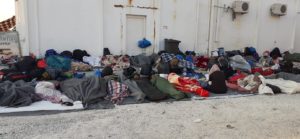
Refugees now sleep on the streets since their camp burned.
While my time in Lesbos was relatively calm until my final morning, everything has changed since then. There are 14,000 refugees living on the streets with no place to go. The government technically sends food once per day, but the distribution system is wildly inadequate; the first people to jump on the food trucks get some food, but many people don’t get anything.
Ali and the team there have changed their focus to feeding people, distributing water and caring for their basic needs. They’ve been consistently feeding between 1,500 and 2,000 refugees per day for the past couple of weeks. It’s very difficult work. They’re up at 4:30 each morning to get started on buying and cooking food, and they work for most of the day. It also can be emotionally draining to be surrounded by suffering and not be able to help everyone.
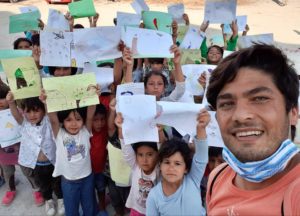
Ali recently gave the refugee children paper and colored pencils to draw.
Still, Ali’s spirits remain high. He’s happy to be there in the midst of the crisis and have the chance to help people in a concrete way. In addition to helping distribute food, water and tea, Ali has organized street cleanups and fun activities for kids.
It’s been inspiring to watch this group express Christ’s incarnational love from afar, even if I wasn’t able to be part of this phase myself. I hope this encourages you that you don’t always have to explicitly tell people about Jesus to be showing others God’s love.
The team has embodied that love just as well over the past two weeks, when they’ve been providing food, water, showers and safe spaces, as they did when they were doing discipleship classes. And that witness can be powerful. The new temporary refugee camp is actually much closer to the Peace House than Camp Moria was — and now, many, many more refugees know what this team is all about.
As you pray, remember the refugees in Lesbos. Pray for solutions for these refugees that work for the long-term. Pray for food and shelter in the meantime. Pray for their health in this traumatic time. And pray for those working with them.
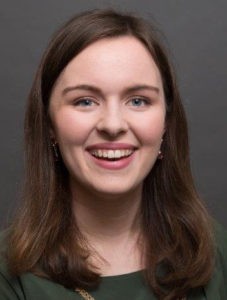 Olivia Haynes is a 2018 graduate of the University of Richmond. After traveling from her Virginia home to Vienna, Austria, in May 2017 on a short-term mission trip and experiencing a church’s work with refugees, she decided to return there for a gap-year program called project:Vienna in September 2018. She has been working in and learning from this multi-ethnic, multi-lingual community for more than two years. She and her soon-to-be husband, Ali Ansari, hope to return to Greece to continue working with refugees there in 2021. Her work in Europe is supported by the Baptist General Association of Virginia and the Cooperative Baptist Fellowship, where she works through student.go as an advocate for freedom of religion and belief protections for asylum seekers. Learn more at her website.
Olivia Haynes is a 2018 graduate of the University of Richmond. After traveling from her Virginia home to Vienna, Austria, in May 2017 on a short-term mission trip and experiencing a church’s work with refugees, she decided to return there for a gap-year program called project:Vienna in September 2018. She has been working in and learning from this multi-ethnic, multi-lingual community for more than two years. She and her soon-to-be husband, Ali Ansari, hope to return to Greece to continue working with refugees there in 2021. Her work in Europe is supported by the Baptist General Association of Virginia and the Cooperative Baptist Fellowship, where she works through student.go as an advocate for freedom of religion and belief protections for asylum seekers. Learn more at her website.
Related articles:
What I fear as a white woman married to a Black man
Refugee ministries adapt amid COVID and government slowdown
We must not look away from 8,800 expelled immigrant children

